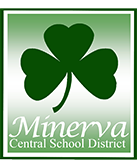Speech-Language
Minerva Central School Speech-Language Program
Minerva Central School provides services to students from kindergarten through twelfth grade.
Speech-language services are provided individually, in small groups, and within the classroom environment.
Mr. Eric Knierim: Speech Language Instructor
Can Speech and Language Therapy Help Improve Literacy Skills?
Did you know that a child’s speech and language development can actually have a significant impact on their development of literacy skills? Many people may not know that literacy skills, such as reading and writing, are actually language-based skills. Research has shown there is a strong relationship between language impairments in early childhood reading and spelling contributing to difficulties in school age children. Since there is a significant relationship between spoken and written language, speech-language pathologists are the specialists when it comes to language development. It makes sense that speech and language therapy can actually impact literacy skills, such as reading and writing! So how exactly can a speech-language pathologist help improve these skills?
Decoding is defined as efficient word recognition and the ability to sound out words based on phonics rules. Difficulties with decoding words typically involve deficits in the area of phonological awareness, or the ability to hear and identify the sounds that make up words.
Language Comprehension is defined as the ability to derive meaning from spoken words, when they are part of sentences or other discourse. Language comprehension encompasses receptive vocabulary, grammatical understanding, and discourse comprehension.
Based on this criteria for reading, children can fall into one of three general categories. Each category requires a specific type of intervention.
Language Comprehension – Children with weak language comprehension skills have weak decoding skills and weak language comprehension skills. Speech-language pathologists can work with children with language comprehension difficulties to improve their vocabulary, increase their understanding of syntactical and morphological structures, and improve their overall discourse comprehension.
Weakness with Decoding – Children with below average decoding skills have adequate language comprehension and weak decoding skills. Children that fall into this category also often receive a diagnosis of dyslexia. Speech-language pathologists can work with children with deficits in decoding to improve their phonological awareness skills. Speech-language pathologists help boost their ability to identify, recall, and retrieve these sounds and link them to written language.
Weaknesses in Both Areas – These children require intervention in both the areas of decoding and reading comprehension.
If you think your child fits into any of these categories mentioned above, please contact Minerva Central School’s special education department to discuss concerns about your child’s literacy skills.
